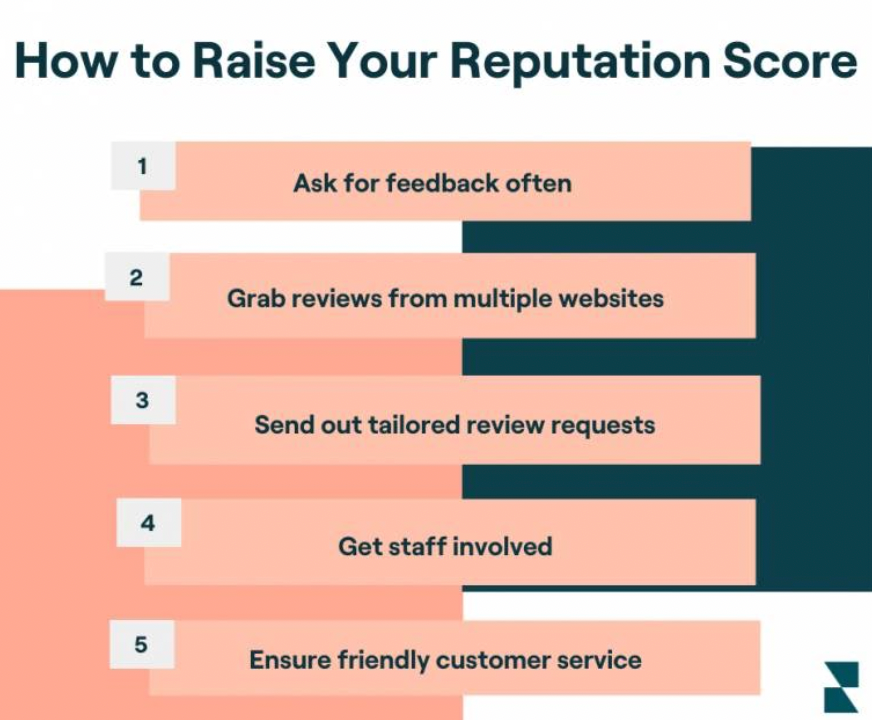How to Raise Your Online Reputation Score
Reputation Staff Writer

When Tom became a property manager for Fairfield Residential, he noticed that his property’s Reputation Score was only 490. He wasn’t sure what the previous property manager’s strategy was but, needless to say, he wasn’t pleased. He immediately put in the work and relied on the Reputation platform to get his property’s score up to an impressive 751 within a matter of months.
The strategies that the team put into place to quickly raise their Reputation Score are applicable to any industry. Here’s a look at what he and the Fairfield team did and how it could work for your business’s online reputation management strategy.
Related: Online Reviews and Ratings 101: A 5-Step Guide to Improving Your Online Reputation

- Ask for feedback often. Your team needs to work to get your Reputation Score up. The best way to do that is to regularly seek out feedback from your customers. As a property manager, Tom makes sure that his tenants receive automated review requests and surveys during move-in/move-out times, and whenever his maintenance team completes a request from a resident. As per the company standard, he also encourages his team to leave “How did we do?” cards that allow less tech-savvy residents to leave feedback for him. But Tom goes above and beyond that and regularly reaches out to his residents to find out how they believe the property management firm is doing. He estimates that he ensures tenants receive survey or review requests between 5-7 times a month. Tom and the whole Fairfield team demonstrate that you shouldn’t be afraid to ask for reviews. However, there needs to be a well-thought-out strategy behind requesting them. For example, path your surveys the right way. As we previously wrote, on top of asking for reviews from happy customers, direct unhappy customers to a short survey that enables a deeper diagnosis of trouble spots. After the survey is completed, direct that customer to Google or another review site to share their honest feedback. This allows you to receive granular insights that help improve customer experience. Make sure you share all reviews — the good, bad, and everything in between.
- Grab reviews from multiple websites. You need to make sure to ask for feedback on whichever site your customers regularly visit. The Reputation Survey solution allows you to select where you want your customer surveys to go — Tom goes into the platform and checks the box for every single one. He knows Google offers the most visibility, but also recognizes that prospects will be spending time on websites like Apartment Ratings. With this strategy, he can get every aspect of his tenant demographic. This is applicable to any organization — be sure to grab reviews from general review sites and those specific to your industry.
- Send out tailored review requests. Customer feedback isn’t a one-size-fits-all situation. Tom makes sure that he uses an automated survey template that addresses his residents by name and properly addresses the appropriate situation. Not only can Reputation help you send tailored review requests, but we offer easy-to-use response templates as well. We use macros to create response templates that are personalized by adding text and the appropriate sentiment. This ensures that each response pulls in the customer information and adds a bit of customization that will make it stand out.
- Get staff involved. Fairfield Residential previously offered a unique, but temporary, program to get its staff excited about online reputation management and implement review response on a daily basis. Whenever a staff member was called out by name in a positive manner, they received a small bonus. If just the property staff itself was praised, then a small amount of money was added to an office pot that was eventually split amongst the whole staff. Make sure your marketing/communications, patient experience, operational, and legal teams are all on the same page for your Reputation Score management strategy. But don’t feel pressured to implement a monetary incentive program if that doesn’t work for your organization. Including reputation management in every department’s quarterly goals is a great way to ensure employees across teams are aligned.
- Ensure friendly customer service. Tom personally follows up with residents who have yet to complete surveys he’s sent to ensure he knows where his team is excelling and where there is room for improvement. Strategies like that have paid off for him immensely. His organization has a regular nationwide meeting for property managers, and he was recognized for his top-notch customer service.
Top-tier customer service should be an unspoken priority for your team. This is especially important when it comes to responding to negative reviews. It’s easy for a customer support team to respond to praise, but a thoughtful response to poor feedback might mean more. Make sure to respond to and acknowledge the feedback as quickly as possible with empathy. Spend extra time coaching your customer service team on how not to get emotional.
The experience of raising and managing a Reputation Score is unique to each business, meaning that some organizations may not see their score rise as quickly as Fairfield’s did. But that doesn’t mean you should give up. Even if it’s a slower process, putting in the work to raise the score will be worth it in the long run. Reach out to your Customer Success Manager to get started.
Keep Reading: A Higher Reputation Score Means a Stronger Brand — Here’s Why










